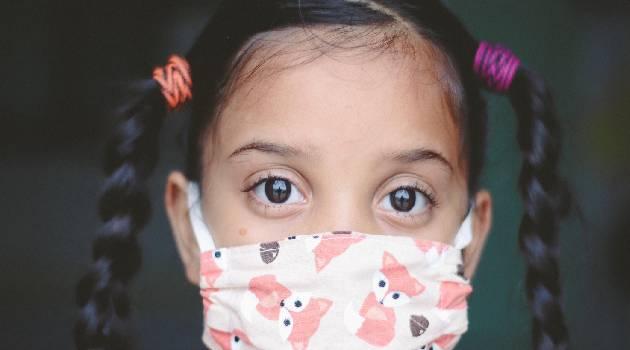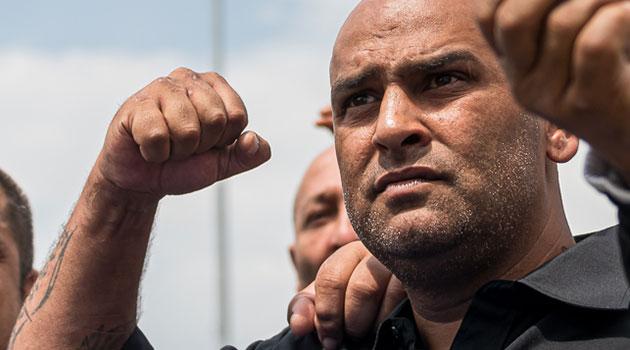Czech regions combat COVID-19 disinformation in socially excluded localities as hospitalizations soar

Markéta Svobodová, head nurse at Masaryk Hospital in Ústí nad Labem, Czech Republic, has no time. “I apologize, call me later,” is how she repeatedly refuses my requests for an interview.
“There’s too much going on. COVID,” is how she summarizes, in one word, the reason she is overwhelmed.
Since spring she has been in charge of vaccinating those who have not been able to access the vaccine on their own, be they people living in senior citizens’ homes or those living in excluded localities; during the summer she got a bit of a break, but currently this fall, when the numbers of infections rose sharply mainly because of the much more infectious Delta variant, bringing the Czech Republic once again among those with the highest infection rates, she doesn’t know what to do first. The head nurse is planning new vaccination visits to the excluded localities of the region once more.
“We knew there would be an autumn wave, but we thought it would basically be milder, and it’s not. So already we are closing other wards again and setting up COVID-19 beds,” she describes.
The reason it is necessary to travel to the excluded localities once more, in her view, is the insufficient information about vaccination in such places. “There are people who are not taking much of an interest in vaccination and the administration associated with it deters them,” she explains.
“That means there is no other way to reach them than to go to them. We are doing all we can so these people won’t end up in our hospitals,” she emphasizes.
“Vaccination protects them against a severe course of the disease,” the nurse says. Hospital intensive care units currently report that those ending up there are exactly the unvaccinated, very often even younger people.
“In my experience, if somebody vaccinated does end up in the intensive care unit, it’s just to get oxygen support, after which that person then quickly returns to the regular ward,” the head nurse says. With just 58 % of the population fully vaccinated, the Czech Republic is currently below the EU average.
The most-vaccinated country in the EU is Portugal, with 86 % fully vaccinated, and the least-vaccinated is Bulgaria, with a mere 24 % of the population fully vaccinated. Since the beginning of the pandemic, more than two million of the Czech Republic’s 10 million people have caught COVID-19 and more than 32 000 have died of it.
According to data and statistics from the European Center for Disease Prevention and Control, COVID-19 death rates are indirectly commensurate to the number of fully vaccinated people; while Portugal has the least deaths per capita, Bulgaria is the worst in comparison with other EU states. As for the Czech Republic, it is one of the most-afflicted EU countries.
Winning people’s trust
Ordinarily there is a team of five people – a doctor, two nurses, an administrative staffer and a driver – who travel to the excluded localities to vaccinate residents, and each such event is planned by either the Regional Health Care Service (an association of hospitals in the region) or local municipal councillors. For such a mission to be successful, what is called an advance guard gets people ready in the area; these are frequently local residents who know the environment well and do their best to get vaccinations to as many people as possible.
Humanitarian organizations are often also involved in outreach and persuasion, such as the Czech Red Cross or the Konexe association, which first tasked itself 10 years ago with providing support to Romani communities during times of crisis. “Knowledge of the local environment is essential, otherwise people won’t trust you,” explains Miroslav Brož, the founder of Konexe, as to why his association in particular is currently guaranteeing the success of the vaccination visits in localities that are mostly inhabited by Romani people.
Head nurse Svobodová confirms the importance of working with people in the field, saying “In my experience, when we vaccinated about 80 people, we had to persuade about 60 of them.” The vaccinations on offer are one-time doses of Johnson&Johnson.
“That’s the key to our success, because many people would never turn up for a second dose,” the head nurse adds. “However, if somebody wants to receive another brand of vaccine, they also have that option.”
According to Brož, the situation has significantly worsened compared to the spring and summer in terms of people’s willingness to get the vaccine. What caused the low turnout earlier in the year were laughable events, like a fortune-teller in Křešice claiming to foretell that within 10 years everybody currently vaccinated will die, but currently disinformation through social media is standing in the way.
“The people who wanted to be vaccinated already are. Those who were uncertain, who had concerns about the vaccine, have been subjected to the influence of disinformation for many months now, social media is literally overflowing with it, and they have become opponents of vaccination,” Brož complains.
“People have seen too many videos posted by different Facebook crazies and they believe they will die if they are vaccinated and stuff like that. Currently they are frequently coming for the vaccination just because circumstances force them to, they don’t want to lose their freedom of movement,” he says.
Combating disinformation
Brož is convinced it is necessary to actively combat disinformation. “I’m currently aiding the Regional Health Service with their campaign to promote vaccination among impoverished Romani people. As part of that campaign, several videos have been produced with different Romani figures from the region speaking of their experiences with COVID-19 and with vaccination. It’s working, but it’s probably the first activity of this type in the Czech Republic, and it’s not enough. There is a need to create more such information campaigns, even better ones,” the activist says.
One figure in the video is Jožka Miker, age 56, a famous Romani activist who helped establish Konexe. “I believe vaccination will aid against this insidious disease,” he said in an interview for Romano voďi magazine.
Miker suffers from Bechtěrev’s disease (a chronic inflammatory disease that damages the joints) and belongs among the high-risk groups for contracting COVID-19, so he has decided to get a booster shot this month. The activists personally know many people who have succumbed to the disease, including the brothers and father of a famous family in the community.
“Even that kind of tragedy will not convince others who believe they will die if they are vaccinated, or that their genetic information will be transformed, or that there are chips in the vaccine,” Miker says, lamenting the fact that he is not succeeding in breaking down such convictions even among his closest family. He claims that his girlfriend and his sister are both among the dyed-in-the-wool “refuseniks”.
Not just in excluded localities
Brož does not believe a higher percentage of people refusing vaccination are to be found in excluded localities than elsewhere in the country. “Many people in the impoverished ghettos have low levels of education. They may have just attended primary school [until 9th grade], for example, but from my own circles I know that people with higher educations who, for example, attended college preparatory school and completed instruction in biology at a higher level also believe there are chips in the vaccines,” he relates.
We interviewed one middle-aged college graduate who said he is also convinced of the harmfulness of the vaccine but who did not wish to be identified by name here. “It’s the vaccine that is killing people, not COVID-19. The globalists (people like George Soros or Bill Gates, who believe in a global market and world and are the opposite of nationalists, who privilege the importance of individual nations) produced the vaccine because they want to exterminate half of humanity,” he explains, with a completely straight face, the bizarre theory that he claims to believe.
An affair of the heart
“In the Ústecký Region, unfortunately, there’s a greater number of such impoverished ghettos and yes, unfortunately, a significant proportion of their residents are Romani. A ghetto doesn’t have to be an entire quarter, as we see in the Předlice quarter of Ústí nad Labem, it can be just one street, or a residential hotel on the outskirts of the city. The mobile vaccination team naturally cannot be everywhere at once,” says the 42-year-old Brož, a father of two who was born in Ústí nad Labem, grew up there, and feels closely connected to the region as a whole.
Brož’s mother used to work in what was once called a “special school” and frequently took him there with her when he was a child, so according to him he got to know the local excluded community of Romani people at an early age. As an adult it then seemed natural that he would return there to begin providing aid.
“As a gadjo [non-Roma] I am ashamed of how this society treats Romani people and what they have to face,” he explains as to why he does what he does. “In the localities in Ústí nad Labem we (Konexe) conducted an information campaign about COVID-19 and upholding the hygienic measures in the spring of 2020, from our own initiative, we put up posters in Předlice and Mojžíř and we also published them through our own social media channels. When designing the posters we took advantage of the fact that one of the supporters and volunteers with Konexe is a doctor. COVID-19 was new then, the impoverished Romani community were scared of it, like everybody back then, hopefully we managed to bring them information, to calm the situation, and to make sure the first wave of the pandemic didn’t impact the impoverished Romani locality as much as it could have.”
Vaccinations against the pandemic
Head nurse Svobodová says that as a health care worker she would like to see everybody get vaccinated, but for the time being she has been grateful that people are at least following the prescribed regulations. Miker says he would agree with introducing compulsory vaccination, as neighboring Austria has done.
“When I did my military service, nobody asked us, they just vaccinated us and that was that,” Miker says. Brož reminds us that quite often it takes a brutal encounter with COVID-19 to change people’s attitudes.
“A person who has experience with somebody being hospitalized in a COVID-19 unit, or with the death of somebody close to them, usually comprehends the danger of COVID-19 even when they didn’t believe it before. They get vaccinated so they don’t have to experience that again,” the activist observes.
The Coalition of Romani Representatives in the Liberec Region has also launched an information campaign there called “Jekhetane – očkujeme se společně k imunitě” (Together – Let’s Vaccinate Ourselves for Immunity), which is aimed at the Romani community and is meant to support willingness to get vaccinated against COVID-19. “Romani youth came forward with this initiative, mostly students who are working together in a project on Community Work in the Liberec 2 Socially Excluded Locality, which we are implementing with the support of the Liberec Regional Authority and the Office of the Government,” says Ján Lányi of the coalition, adding that the campaign aims to motivate both Romani men and women to get vaccinated against COVID-19.
First published in Romano vod’i magazine.
